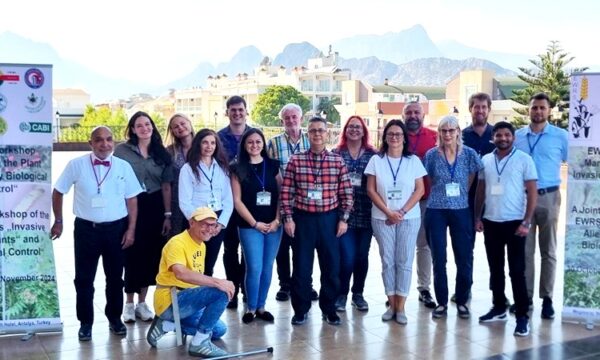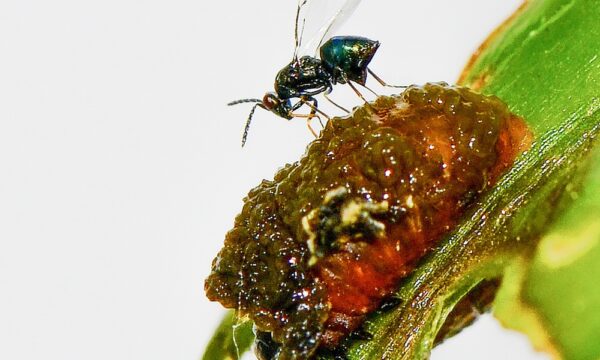
A new study led CABI scientists has examined the potential for collective action to fight the fall armyworm (FAW) pest with biological controls in rural Zambia.
Conducted in partnership with colleagues from the Zambia Agricultural Research Institute (ZARI) and Wageningen University and Research, the research found that some conditions are already in place.
To achieve sustainability in the collective pest management of the Fall Armyworm (FAW), it is necessary to strengthen other aspects.
Fall armyworm (Spodoptera fruigiperda) is an alien invasive pest from the Americas which was detected in Zambia in late 2016 and has since caused significant losses on maize – threatening livelihoods and food security.
Reliance on synthetic pesticides
Farmers rely upon synthetic pesticides to fight the pest but this approach poses risks to human health, the environment and biodiversity.
On the other hand, researchers have proven that biological control options constitute an efficient, cost-effective, and safer method for managing pests and diseases. When adopted collectively, its effectiveness can increase.
Published in the CABI Agriculture and Bioscience journal, the scientists aimed to fill a gap in understanding social and institutional conditions in low- and middle-income countries (LMIC). These countries have a limited national plant health system in place to prevent and manage biological invasions.
Some conditions for collective action in place
They found that some conditions are already in place to support a collective action to manage fall armyworm. The traditional leadership of the communities supports matching rules to local conditions, collective-choice arrangements, a conflict-resolution mechanism, and minimal recognition of rights to organize. These elements constitute the supported features.
However, to achieve sustainability in collective pest management, it is necessary to strengthen other conditions. The most important criteria for a pest management innovation selected by participants from both districts, in no specific order, were price, efficacy, recommended by agrodealer/extension officer and immediate action.
Léna Durocher-Granger, lead author of the research, said, “Our study emphasizes the need to redefine technologies and dissemination in terms of supporting the processes of co-designing innovation based on social and ecological conditions.”
The research looked at the feasibility of creating a collective action to promote biological control for fall armyworm among smallholder farmers in rural Zambia and the social and institutional conditions needed for it to be successful and sustainable.
The scientists conducted focus group discussions and in-depth interviews in two provinces – Central and Southern – with maize smallholder farmers.

Very few farmers identified correctly, for instance, the FAW lifecycle stages when asked compared to other common pests affecting maize in Zambia. When asked to organize the Fall Armyworm (FAW) lifecycle, participants, in general, did not recognize or misplaced the pupa stage in the cycle compared to the correct order (moth-egg-caterpillar-pupa).
Focus on biocontrol
When asked if they had heard of biocontrol, all 12 farmers in Mumbwa reported that they had never heard of it. In Siavonga, only two farmers recalled an introductory meeting at the beginning of the project where biocontrol was mentioned as an option to control Fall Armyworm (FAW).
The two farmers described biocontrol as a practice that targets the pest without harming other beneficial insects and is friendly to human health and the environment. All 24 farmers were aware that once one of them see FAW in his/her field, everyone else has it, demonstrating knowledge on interdependency amongst farmers.
Ms Durocher-Granger added, “If properly coordinated, biocontrol schemes implemented at the landscape level have the potential to significantly reduce the need for applying pesticides, and in this case, increase food safety and security and the livelihoods of vulnerable marginalized farmers. However, researchers need to conduct additional empirical research and implement trials on biocontrol options.”
“To successfully achieve collective management of highly mobile and invasive pests, we therefore recommend developing a long-term plan with farmers to progressively transition towards natural pest regulation provided by ecosystem services where chemicals are the last resort.”
Additional information
Main image: Smallholder farmers study natural enemies of fall armyworm collected from their fields. The petri dishes contain fall armyworm larvae from which parasitoids will emerge (Credit: CABI).
Full paper reference
Durocher-Granger, L., Fiorito, S., Mudenda, S.K. et al. Investigating the feasibility of developing a collective action for biological control of fall armyworm among smallholder farmers in rural communities of Zambia. CABI Agric Biosci 4, 14 (2023). https://doi.org/10.1186/s43170-023-00154-6
The paper can be read open access here: https://cabiagbio.biomedcentral.com/articles/10.1186/s43170-023-00154-6#citeas
Funding acknowledgement
The study was conducted as part of the Action on Invasives (AoI) and PlantwisePlus programmes, funded by the UK Foreign, Commonwealth and Development Office and the Netherlands Directorate-General for International Cooperation. In addition, PlantwisePlus also receives funding from the Swiss Agency for Development and Cooperation and the European Commission (DG INTPA). CABI is an international intergovernmental organisation, and gratefully acknowledges the core financial support from our member countries (and lead organisations) including the United Kingdom (Department for International Development), China (Chinese Ministry of Agriculture), Australia (Australian Centre for International Agricultural Research), Canada (Agriculture and Agri-Food Canada), the Netherlands (Directorate-General for International Cooperation), Switzerland (Swiss Agency for Development and Cooperation), and Ireland (Irish Aid, International Fund for Agricultural Development-IFAD). See http://www.cabi.org/about-cabi/who-we-work-with/key-donors/ for full details.
Related News & Blogs
Biological control in action: Zambia’s field days on fighting fall armyworm
Experts from CABI recently held two field days and an expo in Zambia, showcasing innovative approaches to pest management to 584 farmers, agro-dealers and other stakeholders to help raise awareness of approaches to tackle the invasive fall armyworm (Sp…
11 June 2025




